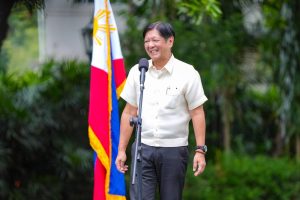Public scrutiny over the misuse of government funds, the squabble between the Marcos and Duterte clans and their allies, and the local and senatorial midterm elections are expected to dominate Philippine politics this year.
Last year ended with President Ferdinand “Bongbong” Marcos Jr. signing the budget bill amid protests from the opposition and various sectors over the inadequate funding for social services and the reported bloated allocation for pork barrel projects. Critics say that the budget is designed to boost the electoral chances of the president’s allies by rewarding legislators with additional funds to distribute to their constituents under the guise of providing financial and medical assistance to the poor.
Some are even considering challenging the constitutionality of the budget realignments made by Congress. Protests are scheduled this month to condemn the “crooked” budget and the “hypocrisy” of Marcos, whose confidential and intelligence funds (CIFs) remain intact while his allies have raised questions over the use of the same funds by Vice President Sara Duterte.
Duterte’s CIFs were removed from the budget bill after evidence of anomalies surfaced in 2023. Three impeachment complaints were filed against her in December 2024, and a fourth complaint is expected to be filed this month over allegations of corruption and improper use of CIFs by her office.
Marcos has publicly discouraged filing a “divisive” impeachment against his former ally but could use it to weaken the political base of the Dutertes. Marcos proved he had other ways of sidelining Duterte by removing her from the National Security Council.
Duterte claims that the impeachment case is a partisan bid endorsed by Marcos allies but ignores the fact that it is being pursued by anti-corruption watchdogs and citizens demanding accountability. The impeachment hearing is expected to commence once Congress resumes its session this month. It can drag on for several weeks and even months depending on the decision of legislators to either endorse or reject the impeachment complaint.
Another contentious issue is the case of former President Rodrigo Duterte who is being investigated by the International Criminal Court (ICC) for alleged crimes against humanity. The Marcos government has repeatedly insisted that it will not cooperate with the ICC but it recently clarified that it will not block the work of investigators and that it may even assist Interpol if an arrest warrant is served against the former president. During a Senate hearing, Duterte said he is willing to be prosecuted by the ICC but his party and loyal supporters would certainly create a ruckus if the case substantially moves forward this year. If the ICC case remains inactive, another option for anti-Duterte forces is to consider the recommendation of a Congress committee to file criminal charges against the former president in relation to the extrajudicial killings during his presidency.
The impeachment hearing of Sara Duterte and the announcement of an update on the ICC case of former President Duterte would coincide with the election campaign period which starts in February. Both the Marcos and Duterte camps have fielded senatorial bets which could prove crucial in deciding the fate of the impeachment complaint against the vice president. Public attention will be focused on the midterm polls, which also provide an opportunity for opposition forces to highlight the everyday concerns of ordinary voters such as inflation, low wages, and poor delivery of social services. Dissatisfaction over the continued reign of political dynasties could influence the voting trend, but options remain limited for this election year. The election results would determine the parties and families with early advantage ahead of the 2028 presidential election.
The year 2024 saw the split of the Marcos-Duterte alliance and the rift will definitely extend during this year’s election. But as politicians squabble for hegemony, they may fail to address rising discontent and the people could render a decisive protest vote against the Marcoses, the Dutertes, and their parties.
































